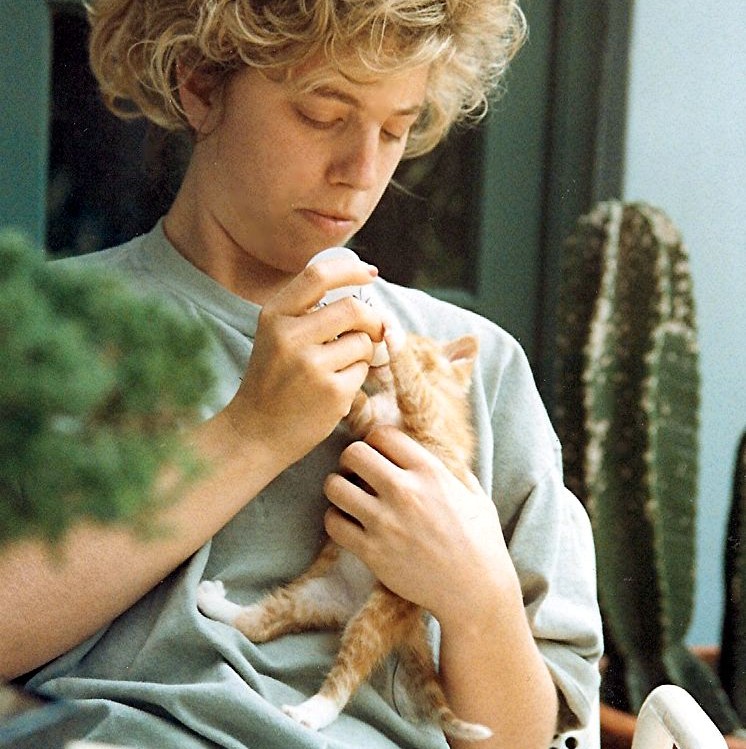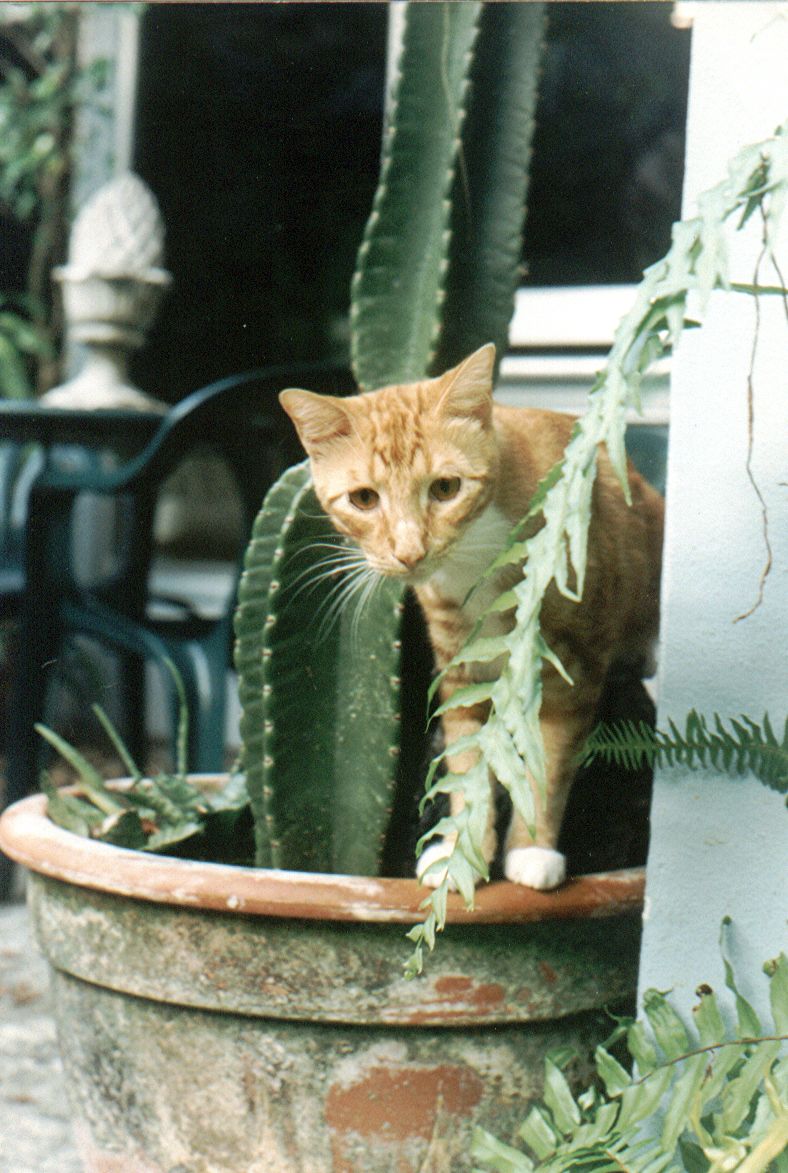By Susan Ford Collins
Little did I know that one of the great teachers would come to me in the form of a little orange kitty. As I sat writing at my computer, my phone rang and I heard my friend Sharon’s voice. She was having an urgent problem and needed my help. I stopped and listened carefully.
A couple of days before, someone had dumped a large cardboard box in Sharon’s yard. As she left for work since then, she grumbled about someone discarding that box on her lawn. But she was busy with a project and hadn’t had time to drag it out to the trash pile … until this morning.
When Sharon walked over and peeked inside, she was stunned. That box wasn’t empty! It contained four tiny kittens, a couple of weeks old! Two were dead already and crawling with maggots. The other two were screaming loudly for help. Sharon immediately called her vet and was told that she would get a callback in fifteen minutes, but after a half hour, she decided she’d better go ahead with Plan B.
Packing “her survivors” into a much smaller, sturdier towel-lined box, she carefully placed them in the car and rushed to a nearby pet store to get help: what should she feed them, how much and how often? The sales team looked at the kitties tenderly and quickly walked Sharon and her box down the correct aisle to a tiny nursing bottle and a six-pack of mother-kitty-replacement milk. The label said to feed the kittens every couple of hours … 24/7. The team wished Sharon well and warned her that, despite her most loving and diligent efforts, the kitties might already be too weak to suck and survive.
Once home, Sharon went into action, opening the can, making sure the milk was baby-bath-water warm, carefully pouring it into the nursing bottle and snapping on the nipple. Sharon decided to feed the smaller kitty first and she picked it up gently. It snuggled in her warm hand and when she offered the tiny nipple, it eagerly accepted it, sucking tiny gulps until milk bubbled out of the corners of its mouth. Relieved, Sharon tucked that contented kitty back into the towel and picked up the other one which started strongly sucking too. After an hour’s nap, they were awake again and happily filled up and contentedly fell back to sleep. So far so good! But now a new problem was surfacing and that’s where I came in.
It was Saturday so Sharon would be able to care for the kitties today and tomorrow, but Monday she would have to go back to work. For years Sharon had joked about my home being “the home of castaways and strays”… unwanted rabbits and guinea pigs, hummingbirds with broken wings and armor-covered wounded iguanas. So I was a likely candidate for taking over her-kitty-mothering responsibilities.
At this point in our conversation Sharon mentioned a word she knew I would respond to… “calico.” Several months before, a calico kitty of mine had been hit by a car. She had dragged her broken body almost up to my front door and died in the bushes unnoticed. I was still grieving, wishing I’d known about her plight and been able to do something to help her. But I didn’t, and I couldn't. So, based on the fact that one of these kitties was a calico, I immediately told Sharon I would take her.
But Sharon quickly responded, “No, they’ve had enough loss already. They only come as a pair. I’ll have to find someone else then.” So, a little begrudgingly, I said I would take them both. Sharon quickly brought them to my house in their new blanket-lined basket, and, sure enough, the calico was exactly like the one I had lost. My heart felt warm and full toward her. I was generous to the orange one of course, but I felt no special connection. I fed him. I cared for him but only as a second. A "me too." I loved watching them chase bugs, lizards and their own tails, reawakening “the kitten in me” as I giggled at their antics.

Early one morning months later there was a violent thunder storm and my nervous cats and dogs piled onto my bed. Finally the lightning and thunder passed and we slept a little. Around six, I made breakfast but only one of the kitties came running when I called them. I had a sick feeling as I headed for my bedroom, and there on the floor at the foot of my bed was the calico kitty writhing and convulsing. I drove frantically to the vet but, with only one block to go, she went limp.
As I walked into the vet with that dead kitty in my arms, the attendant looked in my eyes knowingly. Finally accepting my reality, I turned around to leave, saying I would take my kitty home to bury her. And out near the pond under my tallest bananas trees, I laid another calico to rest. And with my shovel still in my arms, I wept.
As the day drew on, the little orange kitty was getting mad, furious in fact, and directing his full fury at me, biting me and scratching me as if I had intentionally taken his sister from him. I felt the way a distraught mother must feel when she recognizes that she isn't able to fully love her surviving child. Why are you here and not my little calico? I judged myself harshly, hating my feelings and wishing them away. But they were there and they were real and the little orange kitty had probably sensed them all along. So I apologized, and tears streamed down my burning face, sore from so many tears already.
We seemed to make peace with each other in that moment. We had both suffered great loss and so we made a pact… he and I… that we would try to become better friends; that I wanted to get to know him; that I needed his tender, purring support. And I gave him an extra blue-delft dish full of food, letting him know he was very special to me.
Day in and day out, we learned to know each other. Each day as I sat for six to eight hours at my computer, he slid in behind the keyboard resting on my lap. Sometimes he did it so skillfully that I didn't know he was there. The rest of the day the little orange kitty seemed to assume that he was one of the dogs—Mica the elegant Rhodesian, and Mango the gentle Labrador. Wherever they curled up to nap and dream noisily, moaning and twitching, he nestled in the C their curled-up bodies created.
Early one morning there was another violent thunderstorm. I felt panic rise up in me but it wasn't from the storm. It was my old loss memories flooding in—the earlier, similar morning with the calico kitty dying on the way to the vet, and the afternoon I found my first calico dead by my front door. Then, awakening from those painful memories, I started laughing. I dried tears that had poured out already and reached down to caress my new friend.
Little orange kitty, you've done it! You've made me fall in love with you, with your gentle sensitive ways, and your quiet attentive tenderness. I considered calling him "book" or "success," but those names didn't suit him. The little orange kitty had become "The Little Man."

The Little Man had taught me something most precious. Relationships are built on mutual caring and understanding, on getting into each others' rhythms and nourishing each others' dreams. The little man and I "feed and water" each other daily, honest with how we're feeling, completing the same dreams—six am breakfast, out to feed the fish, settling on my lap while I write all morning, purring in the kitchen during our lunch. And he's settled in his favorite spot now, writing this all down with me, putting in paw marks every once in a while.
xxxxxx ttttttttt nnnnnn
I've shared this tender story with you to underline a precious fact I rediscovered with the little orange kitty’s help. Life fills in whatever spaces it creates. If we trust that our needs will be met, if we accept the wisdom of what's being given or taken away, then we can steadily feel life's perfection instead of getting pulled down by our momentary focus on doubt and disappointment, on its imperfection.
In moments of loss we need to stay open to possibilities, even if those possibilities come in the form of a dilapidated cardboard box dumped on our lawn, or a tiny kitten we didn’t really want, holding on to our faith in the goodness of life.
(c) Susan Ford Collins. Contact me for permission to use it.
THE TECHNOLOGY of SUCCESS Book Series… compact, concise and powerful…
the perfect toolbox for today’s “always-on” global world.
$14.95 paperback$3.99 eBook
Your Working Life: Caroline Dowd-Higgins interviews Susan Ford Collins
